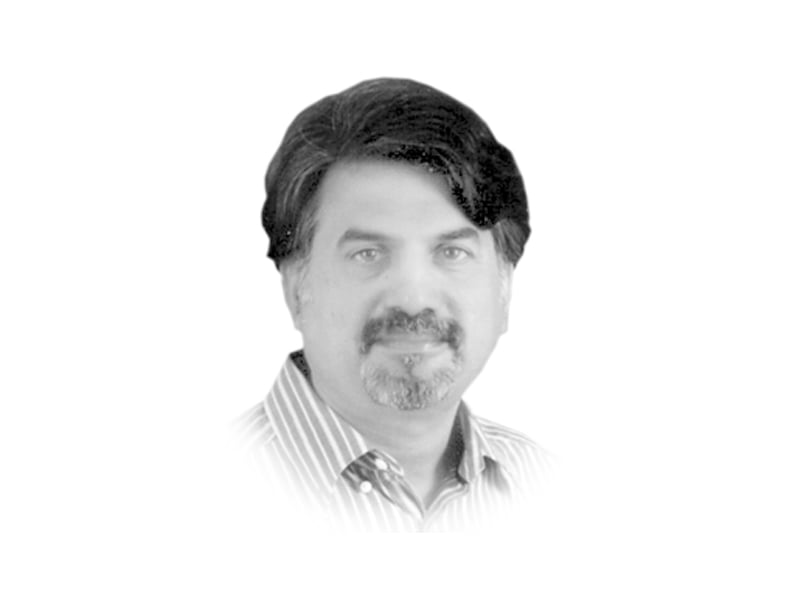

In a political environment of uncertainty and unease, the big question being asked was, can the political parties afford to lose their political power as a consequence of the ongoing military operation? And in the pursuit of the political goal of a ‘corruption-free and terror-free Pakistan’, if the military could target elements from two major political parties, would the third major party, that also happens to be the ruling party, be far away from feeling the heat of the operation? Political pundits forecasted that the ‘likely political consequences of the military operation are too huge’ for the combined political sense and political judgment not to consider and dictate putting the ‘military cart behind the political horse’. It is in this context that two meetings in the week preceding were seen as very important and of vital significance.
First, the prime minister on August 24 presided over a cabinet meeting in Islamabad and while he was doing that, the army chief was flying to Karachi to first chair an ‘in-house discussion’ with his military commanders and later preside over a meeting which was also attended by the provincial chief secretary, IG Sindh, commissioners and representatives of intelligence agencies. While at the cabinet meeting, the usual overall political and security situation in the country came under discussion, the army chief’s visit was more direct and specific. Besides announcing the establishment of more military courts in Karachi, he “directed law-enforcement agencies to break the evil nexus between terrorism, criminal mafias, violence and corruption to ensure a peaceful and terror-free Karachi”.
Clausewitz, the great military thinker, believed that “the concept of pure military advice is nonsensical and the commander-in-chief should sit in the cabinet to allow a properly integrated military and political strategy to develop”. There is no doubt that this is the sensible course of action, and given the current political and security environment, and conditions and circumstances in our country, there could be no better huddle than a ‘political-military huddle’. However, what we saw in the preceding week was that the political strategies being developed by politicians may not be on the same axis as the military strategies being designed and executed by the military.
The statements coming from all political parties, whenever the military operation targets their ‘interests and concerns’, suggests that the much-trumpeted ‘being on one page’ political slogan is a farce. If politicians had deliberated and articulated the political goals (which I doubt they did) that they were setting the military to achieve, specifically for the Karachi operation, they wouldn’t have empowered the military as they have and we wouldn’t be hearing the clamouring and noises that the politicos make every time their parties are targeted. Unfortunately for the politicians, the military operation in Karachi, as it stands today, has no room for politicians to go back on the ‘clear, decisive and attainable’ goals that they have set the military to achieve. The various pauses that we see in the operation may just be a military method to allow politicians to adjust their political considerations against the military’s concerns in the ongoing operation. Today, the internal political struggle and the tug of war between political parties are not vital military concerns. What concerns the military is that the polity should continue to stand upright.
Senior military officers of the rank of colonels and brigadiers are taught ‘operational strategy’ while studying the war course for their career enhancement at the National Defence University and one lesson that they repeatedly learn is that “for military actions to be successful, they have to be in support of political goals”. To its credit, the Nawaz Sharif government has so far stood behind the military, but the real question is, would it continue to do so when eventually its own party’s interests come in conflict with the necessities of the ongoing military operation?
The coming days will be very critical and the ‘pattern of civil-military relations’ will have a definite bearing on the direction and speed the military operation takes in the country. As of now, it seems that for the military, political advice is not ‘militarily proper’ and for the politicians, the military advice is not ‘politically proper’.
One can only hope that the polity will eventually be unified and speak with one voice for the goals that it has set its military to achieve. It can do that only if it is prepared to tolerate the exorcism of all the souls in their political bodies that are full of greed, violence and corruption, and thus merit accountability.
In all appreciations that precede any military operation, ‘time and space’ stand out as huge factors that are debated and analysed. For all those who see General Raheel Sharif’s remaining tenure as a huge critical factor on how and why the current military operation may not achieve its attainable goals, I have only one thing to say. The professional soldier that he is, ‘time and space’ must already have factored in as a critical component of the ‘Karachi-specific military operation’ to ensure the completion of all its stages before he completes his tenure and finally wishes us adieu.
Published in The Express Tribune, September 4th, 2015.
Like Opinion & Editorial on Facebook, follow @ETOpEd on Twitter to receive all updates on all our daily pieces.












COMMENTS (5)
Comments are moderated and generally will be posted if they are on-topic and not abusive.
For more information, please see our Comments FAQ